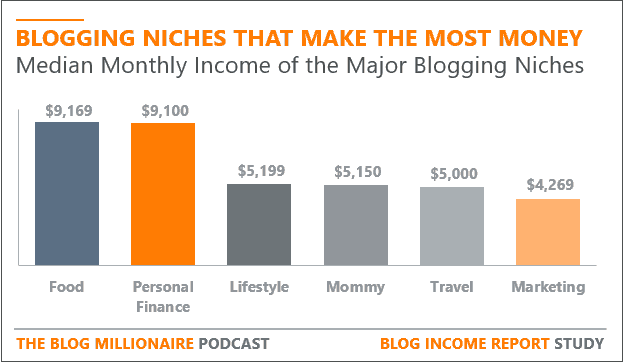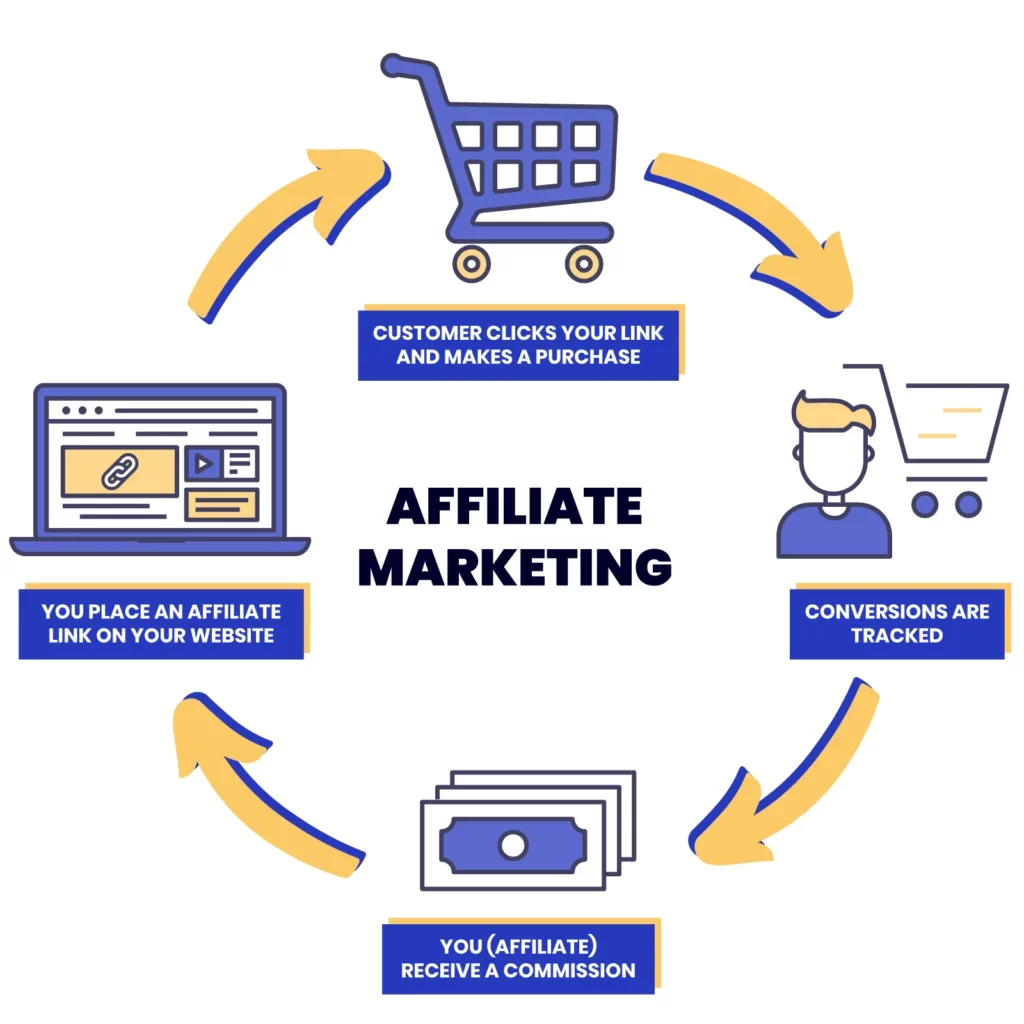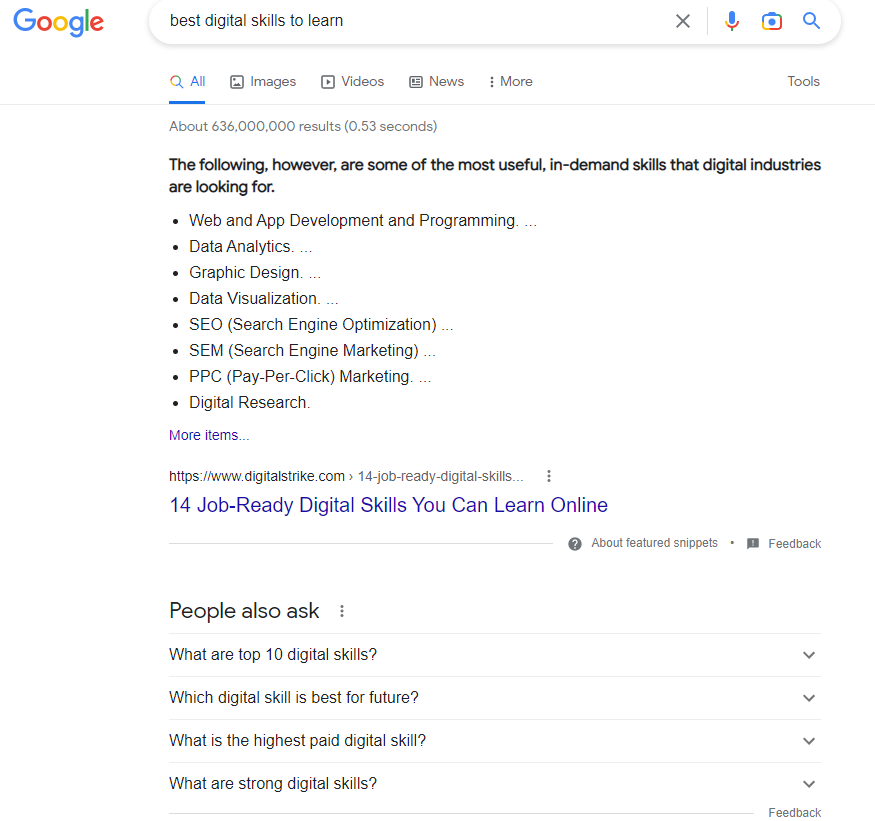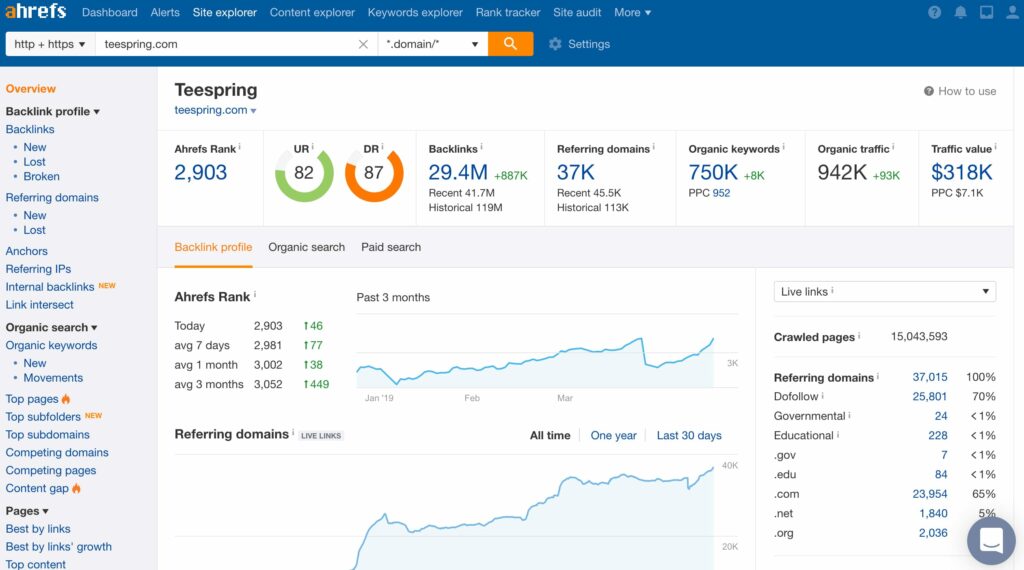Blogging Niche Ideas 2023
4 Easy Steps to Pick the Best Niche for Your Blog : By far and away, the most frequent query I receive from new bloggers is:
Where do I find my niche?
The plain fact is this:
When you’re just getting started as a novice, the chances of selecting the ideal specialty are really slim.
Consider this.
People frequently start a blog, write about it because they are passionate about it, and then quit when it isn’t profitable.
If you want to launch a successful blogging business, you should select your specialty based on four key business aspects rather than your personal interests:

- Potential for Audience Revenue
- Affiliate Marketing Potential
- Professional Leverage
- Keyword Research
Potential Audience Revenue
The most frequent query when beginning a new blog is, “What should my niche be?”
Find a topic you are knowledgeable about and address a problem for your audience.
You must, however, find a way to alleviate a problem that an audience is willing to pay money to have solved.
In order to provide your readers with exactly what they require, you as a blogger must completely comprehend their problems.
And the greatest place to begin is with a self-evaluation. Identify the audiences you are a part of.
If you’ve personally experienced a group’s hardships, you’re much more likely to comprehend them.
Take my blog, for example.
When I started this blog, I was a 31-year old American male working in the tech industry.
was working long hours, neglecting my friends and family, and growing anxious and exhausted from the rat race.
In order to achieve my goals of earning passive money, quitting my job of eight hours a day, and regaining control over my time and life, I started this blog.
Thus, those who were like me made up my target audience:
- Ages 25 to 45.
- Working 9 to 5, yet seeking to leave the rat race.
- Ready to hustle and put in the work.
- Technically adept and intelligent.
- People who want to use blogs to generate passive revenue.
First and foremost, you must comprehend your target.
Understanding how much your audience is ready to spend to alleviate their problems is the second (and equally crucial) stage.
This is the potential revenue from your audience. It’s important to emphasize that you need to comprehend both your target audience and their willingness to pay for your solution

For illustration, suppose you want to launch a blog about human resources and advice for Millennial job seekers.
Readers from a variety of demographics, including job searchers, professionals in the workforce, and college students, may be drawn to your blog postings.
If you decide to build a sales funnel to monetize your blog in this market:
- To draw online readers, you create fresh content.
- The next step is to create a lead magnet called a “job interview checklist” to get email opt-ins.
- Thirdly, you insert affiliate links for some of the goods you want to market.
- Last but not least, you promote “The Ultimate Job Interview Preparation Online Course,” a $300 offering.
There is nothing wrong with this strategy.
This is usually the strategy used by most novice bloggers. I figure you might start earning a passive income in 2-3 years if you put in a couple years of content production and email list growth.
However, you can significantly boost your blog’s income potential by slightly changing your possible niche.
You just switch your target market from job seekers to employers.
Let me clarify.
You can change your blog’s readership from individuals to businesses by incorporating a B2B element.
Businesses are more likely to pay you promptly since they have bigger bank accounts.
Your blog launch, content, and marketing funnel are all very much the same with this strategy, which is lovely. However, you don’t just stop at a $300 course with the B2B component. The final element of five-figure internet consulting can be added.
Instead of creating a blog article on how to ace an entry-level interview, establish yourself as an authority and target businesses directly by charging thousands of dollars per month for services like HR audits or onboarding advice.
Offering consulting services is a terrific strategy to make more money with less traffic when you’re just getting started and it’s difficult to get any visitors.
It’s straightforward math: if your new blog has 100 views and has a 2% conversion rate, your two sales ought to total thousands of dollars rather than $19.99.
Consider creating a high-end consultation product instead of concentrating on adding affiliate links and adverts to your site when you first have limited traffic in order to gain traction and start making money.
Just being aware of your audience’s problems is insufficient, keep in mind.
A section of your audience must be in a lucrative business segment and make recurring monthly payments in order to increase your revenue potential.
With this strategy, I hope you’re starting to see why I firmly believe that you can start a new site and earn $10,000/month in 90 days.
These new funds will be used to accelerate your path to passive income, but we’ll leave it at that for now.
We’ll stop there for the time being, but these additional cash will be put to use to hasten your transition to passive income.
Let’s move on to affiliate marketing, a topic about which I am really passionate.
Affiliate Marketing Potential
Your niche must have the potential for affiliate marketing.
My preferred method for making money from my site is affiliate marketing. The most passive, you can earn money while you sleep after you start getting traffic.
The practice of promoting the goods and services of other companies while earning a commission on each transaction is known as affiliate marketing.

You can join affiliate programs at the majority of big businesses. Once you’ve applied and been accepted into their programs, you can take your special affiliate links and post them to your blog. You can also examine reporting on clicks and sales, as well as any upcoming payouts that are due.
The following steps will help you begin affiliate marketing:
- On the company’s website or through an affiliate network, submit an application for the affiliate program. You’ll need a website and a domain-based email address for this, not just a Gmail or Yahoo account.
- Once approved, copy and paste your specific affiliate link into any content on your blog.
When a user clicks on that particular link, a cookie is placed on their computer and for the duration of the cookie, which is commonly 30, 60, or 90 days, you are given credit for the sale.
Now, what springs to mind when you think about blogging?
- Perhaps they are posting about their recent family purchases on their lifestyle blog.
- Or a blogger who touts fitness affiliate programs while offering you wonderful tips on how to reduce weight.
- It might even be a fascinating individual writing their own autobiography.
I want you to forget about these types of blogs.
Although they might make for intriguing reading, they aren’t the markets that will make you the most money.
Instead, think about this straightforward formula
- You need affiliate income to blog successfully and earn a lot of money.
- You must rank on search engines and drive visitors to your website in order to earn affiliate income.
- You must rank for terms that bring in the greatest affiliate earnings if you want to increase website traffic.
What then are these essential phrases?
The best keywords are those that contain the word.
Here are a few example
- It could refer to the best credit cards, auto loans, or home insurance in terms of finances.
- The best laptop of 2020, best VR headsets, or best Mac accessories are some examples of tech-related terms.
- It might be the greatest website builders, email marketing tools, or web hosting in marketing (like my blog).
- The best travel insurance or the best coworking spaces are examples of travel-related keywords.
People searching for product reviews enter these “best” terms into their search engines.
Before making a purchase, people want to read a blog with in-depth information about the “greatest” something (and aren’t yet ready to just visit a company’s website and make a purchase).
Consider this.
If you’re searching for a new laptop, you might type in “best laptop of 2020.”
Google this term right now and look at the top 10 results.
Every single website in the top 10 results is an affiliate. Notice how there are no actual companies selling laptops. There’s no Best Buy, Walmart, Dell, or HP – only affiliates recommending laptops.
Now try Googling “best credit cards.” What do you see?

Again, every single top 10 result is an affiliate blog.
Why do these affiliate sites outrank brands selling the products?
They write long-form, in-depth review articles that search engines (and readers) prefer.
In fact, 49% of consumers depend on influencer reviews and recommendations.
You’ll begin to realize is that most profitable blogs are, in fact, review websites making affiliate commissions from list posts.
And the truth is, these recommendations are primarily based on how much money the affiliate blog is making from their top recommendations – not the actual quality of the product itself.
Once you grasp this when you learn how to start a blog, you’ll begin to see affiliate sites everywhere.
So now, copy sites like these when you consider blogging and developing your niche:
- Finance: CardRatings, WalletHub, Fool.com, NerdWallet, etc.
- Technology: CNET, Techradar, Wire Cutter, and Tom’s Guide.
- Travel: Expert Vagabond, The Points Guy, and Nomadic Matt.
- Business: FitSmallBusiness, FinancesOnline, and The Balance SMB.
I believe that for brand-new blogs, the most lucrative markets at the moment are those of finance, technology, travel, business, and marketing.
But there are thousands of other alternatives.
Know that your site should have the ability to generate income from affiliate marketing before we discuss keyword research.
Let’s move on to your professional leverage as the next tool in your blogging armory.
Professional Leverage
Apply Your Professional leverage
Finding your strategic advantages is the next step in learning how to start a blog after identifying a valuable audience to whom you can add value.
Think about it:
- What is the extent of my professional experience at the moment?
- What relationships do I have in my field?
- Is it possible to turn this experience into a successful blog?
- Who would pick me first if I could pitch any website in the world to write a guest post?

Take use of all your opportunities. With the use of guest pieces, backlinks, and social shares, these benefits will assist you in gaining early traction.
Let’s now discuss the final (and most crucial) aspect of selecting your specialization.
Keyword Research
In my opinion, conducting keyword research is the most crucial stage in selecting a blog niche. It is extremely easy.
Do readers want to read about the topics you wish to write about?
Every blog article must concentrate on a single target term. You won’t ever get traffic if no one is looking for it. It is a proven truth that in order for your blog to rank and receive traffic, you must have a basic understanding of keyword research and search engine optimization (SEO).
Why?
Every day, people spend six and a half hours online.
Google is used 63,000 times each second. The number of searches is 3.8 million every minute, 228 million per hour, and 5.6 billion per day.
Additionally, search engine organic traffic is far more valuable than traffic from social media. Instead of surfing the web mindlessly, people do high-intent searches to find solutions to their issues.
The good news is that SEO tools exist to make sense of all of this search data. You may view specific keyword metrics, such as the following, using programs like SEMRush and Ahrefs:
- The number of times a keyword is searched for each month is known as the monthly search volume.
- On a scale of 0 to 100, how challenging is it, given the level of competition, to rank for a given keyword?
- The average cost per click (CPC) indicates how much the keyword would be worth if a PPC ad were created and clicked on. It’s a reliable sign of the keyword’s worth.
What then do you search for?
Search for keywords with a large search volume and little competition.
Here is my assessment on these rival metrics.
Volume of monthly searches
- 0-1,000: Low
- 1,000-5,000: Low/Medium
- 5,000-20,000: Medium
- 20,000-100,000: High
- 100,000+: Very High
Keyword Difficulty:
- 0-20: Low
- 21-50: Medium
- 51-75: High
- 76+: Very High
On my site, there are two main types of keywords I target when it comes to SEO: high-volume/high competition and medium volume, low competition.
1. Medium-Volume, Low-Competition, High CPC Keywords as Revenue Drivers
Medium volume, low competitiveness keywords should be the first ones new blogs look up in search engines.
Let’s look at my post on webinar software as an illustration. Within four months of publishing this content, I ranked #1 for this keyword.
- Key phrase: webinar software
- 4,300 searches per month
- Keyword complexity: 22
- CPC on average: $25.00

4,300 monthly searches may not seem like much, but since the top spot receives more than 33% of all traffic, I may anticipate receiving 1,419 monthly visitors for the top spot for this term.
Additionally, with a keyword difficulty score of 22, this term should be rather simple to rank for (in fact, I got to page 1 just a few days after publishing the blog post).
Finally, it is a valuable, high-intent search keyword with an average CPC of $25.
An aside regarding the quantity of keyword searches:
Even while the term “webinar software” receives 4,300 monthly searches, there are thousands of possible permutations, such as “best webinar software,” “webinar tools,” “webinar platforms,” etc. I generally double or even treble my volume projections based on the primary goal keyword because this post can rank for all of these variations as well.
Pro Tip:
You can see the keywords that the top-ranking pages for your target keyword also rank for in the top 100 search results by using Ahrefs’ Also Rank for Report. This enables you to discover less obvious keywords that you can also use in the copy and subheadings of your post.
By using more precise search terms, you might select pertinent keywords from this report to employ for your site. Use “vegan recipes” in place of “cooking,” for instance. Instead of “marketing,” you may use “email marketing services.”
How to locate this kind of search term for your blog:
Apply a filter to the results using a tool like Ahrefs. Set the Keyword Difficulty filter to a maximum of 50 and the Monthly Search Volume filter to a minimum of 1,000.
What these terms are helpful for:
The majority of your posts should contain these keywords, which will also serve as your blog’s primary source of income. The secret is to locate a significant number of long-tail keywords in your niche with medium search volume and low competition.
You’re well on your way to discovering a lucrative niche and resolving a problem if these keywords are followed by phrases like “how to” and “best.”
2. High-Volume/Medium-High Competition Blog Builders
The second class of keywords I focus on are extremely competitive, high-volume terms that are difficult to monetize but have a great traffic potential.
Take my article How to Make Money Online as an example.
- how to get money online as a target
- 103,000 searches per month
- Keyword complexity: 55
- CPC on average: $2.00

The volume of this keyword is 25 times more than that of webinar software, to start. Ranking in the top 5 places for this term could result in bringing in between 30 and 65,000 visitors per month due to the high search traffic and several keyword variations.
In contrast to webinar software, this keyword has a lesser search intent. We are aware of what the searcher wants thanks to the keyword webinar software.
We have no idea what this user would be interested in with regards to how to make money online, whether it be podcasting, coupon clipping, or starting an internet business.
Because it is less specific and more difficult to monetize, the average CPC is only $2.00. However, this term can attract a lot of visitors and encourage them to click over to other, more lucrative blog entries.
How to locate this kind of search term for your blog:
Apply a filter to the results using a tool like Ahrefs. Set the Keyword Difficulty filter to a maximum of 75 and the Monthly Search Volume filter to a minimum of 20,000.
What these terms are helpful for:
Five to ten pillar blog posts using these keywords should take a lot of time and effort to write. Even while these high volume keywords won’t bring in any money right away, they flood your blog with visitors and can expand the size of your email list.
Summing Up Keyword Research
A blog needs a mix of both high volume keywords and high intent keywords.
This entire strategy comes into play when planning your blog’s first five posts. For example, a few posts should be large how-to guides with high search volume to bring in readers. And a few other posts should be low volume/high intent keywords that can be monetized.
- SEMrush
- Ahrefs
- Google Keyword Planner
Conclusion: Choosing Your Niche
Your specialty requires keyword research, professional leverage, affiliate marketing potential, and audience revenue potential.
Selecting a lucrative specialty will help you avoid wasting endless hours of time and effort. One of the most crucial factors in blogging success is this early planning.
Read more on Niimartey.com: There are countless niches you may choose from, but the most crucial thing is that you do your homework and select a subject that interests you.
You Might Like: Step-By-Step Guide On How to Create an Online Course in 2023




Leave A Comment